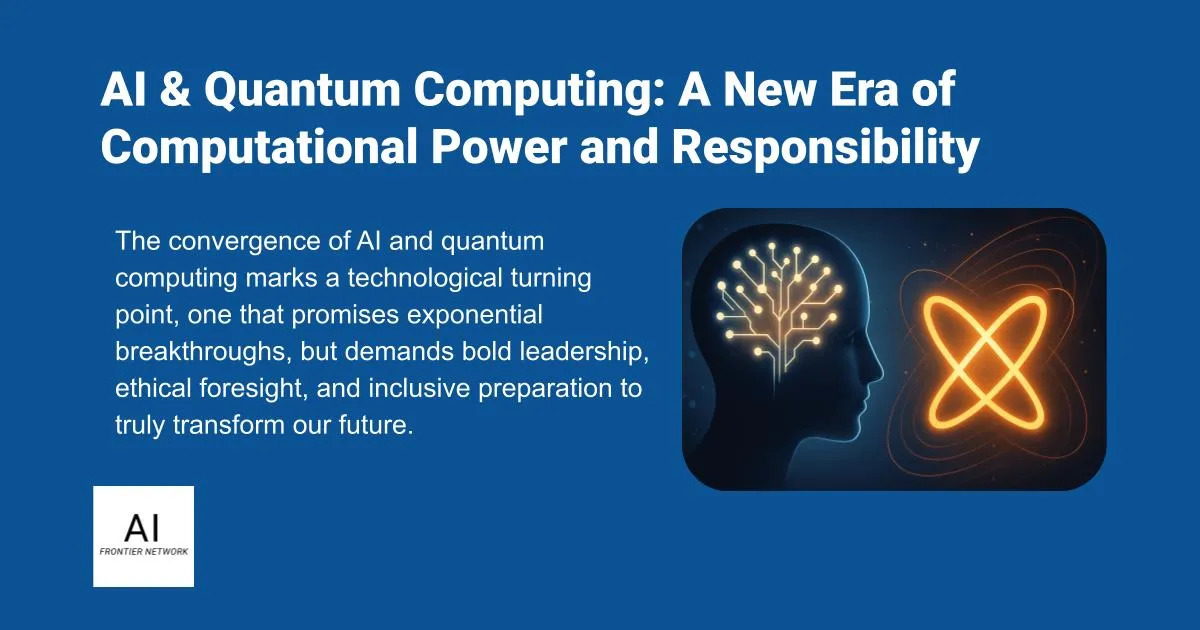The convergence of artificial intelligence and quantum computing represents a seismic shift in how we solve problems, model the world, and build future systems. This is not merely an incremental evolution, it’s a foundational rethinking of computation itself.
Across industries such as healthcare, finance, logistics, and cybersecurity, early adopters are beginning to pair AI’s pattern recognition with quantum computing’s exponential parallelism. The result? Solutions that were previously inconceivable are now within reach. But realizing this promise at scale requires more than hardware and algorithms. It demands new policies, disciplines, and ethical foresight.
Breakthroughs at the Edge of Physics and Intelligence
“AI amplifies quantum’s power to unlock next-gen breakthroughs in drug discovery, financial optimization, and secure communications,”
Think AI-guided quantum simulations that slash R&D time, or autonomous quantum-enhanced cryptography redefining how we secure sensitive data. Rajesh Sura calls it a once-in-a-generation leap:
“Quantum-enhanced AI models could tackle optimization problems and scientific simulations at a scale that classical systems cannot match.”
Pratik Badri outlines the critical areas already transforming:
Optimization: Quantum algorithms like QAOA could revolutionize logistics, finance, and supply chains.
Simulation: AI + quantum will unlock unprecedented precision in modeling drug interactions or climate systems.
Cryptography: From threats to traditional encryption to building post-quantum-secure systems, this domain is a high-stakes battleground.
Automation: Businesses will make faster, smarter decisions across industries as this convergence matures.
Before Scale: The Challenges We Must Overcome
Sumaiya Noor breaks the roadblocks into four clear categories:
Technological Maturity: Quantum systems are still error-prone and unstable, requiring progress in hardware and error correction.
Algorithm Development: Most current AI models are not transferable to quantum contexts. Novel frameworks are needed.
Data Interfacing: Bridging classical and quantum systems remains complex.
Talent: Interdisciplinary expertise in both quantum physics and AI is still rare.
As Rajesh Sura emphasizes, “We need to stop treating quantum as a distant future. It’s time to start now, before the gap widens.”
How Industries Should Prepare
“Start small,”
Mohammad Syed
“Pick a tough business problem and experiment using quantum simulators and AI models.”
Pankaj Pant agrees. The smartest steps today include:
Launching pilot projects via cloud-accessible quantum platforms
Training employees or hiring hybrid-skilled professionals
Partnering with research labs and universities
Developing a roadmap for quantum-resilient cybersecurity and AI integration
Balakrishna Sudabathula calls this “adaptive readiness”—a strategy that blends workforce preparation with flexible infrastructure.
“Organizations that prepare now will lead the future, not follow it,”
Ethics and Governance Must Catch Up
As Gonzalo Diaz Amor argues, this is not just a tech revolution, it’s a societal transformation. We’re not just enhancing what machines can do. We’re reshaping the boundaries of trust, privacy, and human agency.
Key areas needing urgent attention:
Post-quantum cryptographic standards
AI + quantum risk frameworks
Quantum ethics and equitable access policies
Transparency in quantum-enhanced AI decision-making
“Combining AI’s decision-making with quantum’s compute power raises the stakes,”
“It’s about fairness, transparency, and responsibility.”
As Mohammad Syed puts it:
“Quantum AI must empower people, not just outperform systems.”
We’re Already Seeing the Future Unfold
At Microsoft, CEO Satya Nadella shared the company’s breakthrough with topoconductors and the Majorana 1 processor, highlighting a clear path to scalable, stable, million-qubit quantum processors.
At IBM, Darío Gil unveiled Quantum Heron, achieving 5,000+ two-qubit gate operations and marking a key milestone in fault-tolerant quantum processing.
And in the words of the Kindred CEO:
“The people thinking about quantum computers originally weren’t just chasing power, they were redefining the boundaries of what’s computable.”
What Needs to Happen Next
Nivedan Suresh sums it up best:
“AI and quantum computing will revolutionize optimization, simulation, and cryptography, if we invest in readiness, resilience, and responsibility.”
This is not the time to wait. It’s the time to:
Build hybrid teams
Fund ethical innovation
Prepare infrastructure
Co-develop regulatory frameworks
Rethink what we should compute, not just what we can
The AI-quantum convergence won’t be a moment. It will be a movement.











